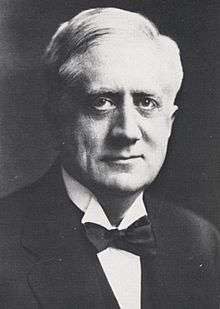Gösta Forssell

Carl Gustaf "Gösta" Abrahamsson Forssell (2 March 1876 – 13 November 1950) was a Swedish medical researcher and professor in radiology and radiotherapy. He headed the radium clinic at Serafimerlasarettet in Stockholm and then its successor Radiumhemmet. His publications defined what became known as the "Stockholm method" of cancer therapy.
Early life and education
Forssell was born on the estate of Vassbo in Aspeboda socken, Kopparbergs län. His father Abraham Forssell was an agronomist and businessman; Carl Gustav was the eldest of seven brothers,[1] most of whom also became scientists, engineers and historians, and he also had two sisters. He graduated in 1895 from the Norra Latinlärovärket in Stockholm and began university studies at the University of Stockholm in theology but soon changed to read medicine; he earned his M.B. in 1902,[1] his medicine licentiat in 1906 and in 1913 became M.D. at Karolinska Institutet.[2][3] His doctoral thesis, on the relationship between X-rays of the human stomach and its anatomical structure, won the 1917 Jubilee Prize of the Swedish Medical Association.[2][4] In 1899, while still a student, he spent a year as assistant to Thor Stenbeck, who that year performed the first successful radiotherapy of skin cancer using radium.[1][5] In 1903 and 1908 he visited France and observed pioneering work with radiation and electricity, including by Antoine Béclère and Jean Bergonié.[1]
Career
Forssell was appointed assistant in radiology at the University of Uppsala in 1902.[1] From 1906 to 1908, he directed the X-ray institute in the surgical clinic at the Serafimerlasarett; he then became director of the radiological institute there. From 1910 to 1926 he was chief physician at its successor, Radiumhemmet.[2][3][6] He also held a professorship in medical radiology at Karolinska Institutet from 1916 to 1926, when he was promoted to professor ordinarius. From 1936, when a separate chair in therapeutic radiology was endowed,[1] until his retirement in 1941 he was professor of diagnostic radiology; he was then appointed professor emeritus.[3] After retirement he worked as a consultant to an insurance company.[1]
Forssell played a major role in the founding of several professional associations: the Svensk förening för medicinsk radiologi (1918), the Nordisk förening för medicinsk radiologi (Nordic Society of Medical Radiology, 1919) and the Svenska sällskapet för medicinsk forskning (Swedish Society for Medical Research), and was founder editor of Acta Radiologica (1921),[2] where he continued as editor until his death.[3][4] He presided at the second International Congress of Radiology in Stockholm in 1928.[1][3]

Research and publications
Forssell published more than 200 papers.[3] His reports on the radium treatment of cancer, particularly uterine cancer, in what became known as the "Stockholm model", in particular "Erfarenheter om radiumbehandling av underlivskräfta vid Radiumhemmet i Stockholm 1910–1913" (Hygiea, 1915), were widely read and influential,[3] as was his "Studies of the mechanism of movements of the mucous membrane of the digestive canal" (The American Journal of Roentgenology, 1923).[2] He coined the term 'brachytherapy'.[1] Among his early work were experiments in dark vision to determine why reading fluoroscopes was so challenging and tiring.[7] When he turned 65, the "Gösta Forssell Research Fund", amounting to 100,000 kronor, was created to support his and others' research and the continuation of Acta Radiologica.[3][4]
Honours
Forssell was a member and honorary member of many learned societies outside Sweden;[2] he was a Fellow of the British Royal Society of Medicine and was awarded the gold medal of the Radiological Society of North America[1] and a number of honorary doctorates.[4]
Personal life and death
He married Esther Gottlieb, a secretary and translator, in 1906; they had four children.[1] He died in Danderyd at the Karolinska University Hospital, aged 74.[1][3]
References
- 1 2 3 4 5 6 7 8 9 10 11 12 Juan A. Del Regato, Radiological Oncologists: The Unfolding of a Medical Specialty, Chapter 5, Reston, Virginia: Radiology Centennial, 1993, ISBN 9781559031356, pp. 37–44, pdf; also International Journal of Radiation Oncology*Biology*Physics 2.7–8 (July–August 1977) 783–90, doi:10.1016/0360-3016(77)90064-5.
- 1 2 3 4 5 6 "Forssell, 2. Karl (Carl) Gustaf (Gösta) Abrahamsson", Nordisk familjebok 2nd ed. supplement, 1923, cols. 971–72, online at Project Runeberg (in Swedish).
- 1 2 3 4 5 6 7 8 9 "Gösta Forssell, M.D.", The British Medical Journal 1.4698, 20 January 1951, p. 143.
- 1 2 3 4 Erik Lindgren, "C Gösta Forssell", Svenskt biografiskt lexikon , retrieved 22 June 2016 (in Swedish).
- ↑ Lars-Erik Hansson, "Röntgenkronologi ur ett svenskt perspektiv", 1995, archived at the Wayback Machine, 2 February 2003 (in Swedish).
- ↑ Andre J. Brewer, Proceedings: 39th International Congress on the History of Medicine: September 5–10, 2004 Bari-Metaponto, Italy, Volume 2, Bari: Progedit, 2004–, ISBN 9788888550664, p. 236.
- ↑ His unpublished 1912 work on the topic is "Iakttagelser öfver seendet vid röntgengenomlysningar". Solveig Jülichin, "Seeing in the Dark: Early X-Ray Imaging and Cinema", in Moving Images: From Edison to the Webcam, ed. John Fullerton and Astrid Söderbergh-Widding, Stockholm studies in cinema, University of Stockholm, Filmvetenskapliga institutionen, Sydney: Libbey, 2000, pp. 54–55; p. 58, notes 38–40.
Further reading
- Åke Åkerlund, Gösta Forssell. Levnadsteckning ... Med porträtt, Levnadsteckningar över K. Svenska Vetenskapsakademiens ledamöter 143, Stockholm: 1954, OCLC 557211759, (in Swedish).
- Åke Åkerlund, "Gösta Forssell, 1876–1950: To the Memory of His Life and Work", Acta Radiologica Suppl. 131 (1956) 1–50.
- "Gösta Forssell, 1876–1950", The American Journal of Roentgenology and Radium Therapy 65.3 (1951) 481–87.
- "Obituary—Gösta Forssell, Dr. Med. & Phil.", The British Journal of Radiology 24 (1951) 17.